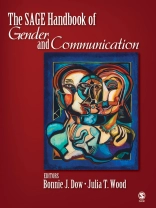The
SAGE Handbook of Gender and Communication is a vital resource for those seeking to explore the complex interactions of gender and communication. Editors Bonnie J. Dow and Julia T. Wood, together with an illustrious group of contributors, review and evaluate the state of the gender and communication field through the discussion of existing theories and research, as well as through identification of important directions for future scholarship. The first of its kind, this
Handbook examines the primary contexts in which gender and communication are shaped, reflected, and expressed: interpersonal, organizational, rhetoric, media, and intercultural/global.
Key Features:
- Brings together the expertise of leading scholars: Esteemed scholars edit each section and leading researchers in the field author each chapter. The distillation of scholarship in each area by seasoned scholars clarifies what is and is not known in that area of research.
- Offers historical and theoretical perspectives: Authors discuss the development of gender and communication research during the past three decades and examine the theories, questions, and issues about gender and communication that are ascending to define the next stage of work in the area.
- Provides comprehensive reference lists: Each section summarizes existing theory and research related to an area of gender and communication scholarship and guides readers to the central works in the field, as well as directs future scholarship toward the most urgent, important, and promising topics, methodologies, and/or perspectives.
विषयसूची
The Evolution of Gender and Communication Research: Intersections of Theory, Politics, and Scholarship – Bonnie J. Dow and Julia T. Wood
Part I: Gender and Communication in Interpersonal Contexts
Introduction – Julia T. Wood
1: Performing Gender and Interpersonal Communication Research – Elizabeth Bell and Daniel Blaeuer
2: Gendered Communication in Dating Relationship – Sandra Metts
3: Gender and Family Interaction: Dress Rehearsal for an Improvisation? – Kathleen M. Galvin
4: Communication and Gender Among Adult Friends – Michael Monsour
5: Gendered Communication and Intimate Partner Violence – Michael P. Johnson
Part II: Gender and Communication in Organizational Contexts
Introduction – Dennis K. Mumby
6: Back to Work: Sights/Sites of Difference in Gender and Organizational Communication Studies – Karen Lee Ashcraft
7: Construction Embodied Organizational Identites: Commodifying, Securing, and Servicing Professional Bodies – Angela Trethewey, Cliff Scott, and Marianne Le Greco
8: Love, Sex, and Tech in the Global Workplace – Nikki C. Townsley
9: Gendered Stories of Career: Unfolding Discourses of Time, Space, and Identity – Patrice Buzzanell and Kristen Lucas
Part III: Gender and Communication in Rhetorical Contexts
Introduction – Karlyn Kohrs Campbell
10: Gender and Public Address – Karlyn Khors Campbell and Zornitsa Keremidchieva
11: Gender in Political Communication Research: The Problem With Having No Name – Vanessa B. Beasley
12: The Intersections of Race and Gender in Rhetorical Theory and Praxis – Jacqueline Bacon
13: Rhetoric and Gender in Greco-Roman Theorizing – Cheryl Glenn and Rosalyn Collings Eves
14: A Vexing Relationship: Gender and Contemporary Rhetorical Theory – Nathan Stormer
Part IV: Gender and Communication in Mediated Contexts
Introduction – Bonnie J. Dow
15: Feminism and/in Mass Media – Angharad N. Valdivia and Sarah Projansky
16: Gender, Race, and Media Representation – Dwight E. Brooks and Lisa P. Hebert
17: Critical Studies in Gender/Sexuality and Media – John M. Sloop
18: Gendered Violence and Mass Media Representation – Lisa M. Cuklanz
19: Gender and New Media – Mia Consalvo
Part V: Gender and Communication in Intercultural and Global Contexts
Introduction – Fern L. Johnson
20: Gender With/out Borders: Discursive Dynamics of Gender, Race, and Culture – Lisa A. Flores
21: Negotiating Boundaries, Crossing Borders: The Language of Black Women′s Intercultural Encounters – Marsha Houston and Karla D. Scott
22: Transgressing Gender in Discourses Across Cultures – Fern L. Johnson
23: Globalizing Gender Studies in Communication – Radha S. Hegde
लेखक के बारे में
Julia T. Wood (Ph.D., Pennsylvania State University) is Professor of Communication Studies and Lineberger Distinguished Professor of Humanities at the University of North Carolina at Chapel Hill. She teaches and conducts research on personal relationships, intimate partner violence, feminist theory, and the intersections of gender, communication, and culture. She has authored or edited 23 books, including Who Cares?: Women, Care and Culture, and Gendered Lives, now in its 7th edition. In addition, she has published more than 70 articles and book chapters. During her career she has received 12 awards for scholarship and 11 for teaching.












